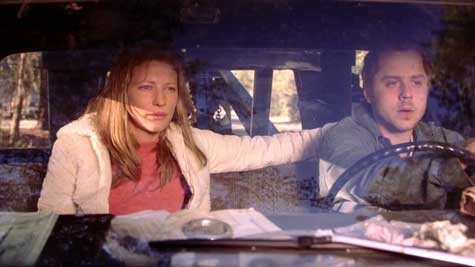Cate Blanchett, fresh from her iconic portrayal of Queen Elizabeth I in Elizabeth (1998), surprised audiences and critics alike with her next leading role in Sam Raimi’s supernatural thriller, The Gift (2000). This film offered a stark contrast to her regal debut, showcasing Blanchett’s remarkable range and solidifying her status as a versatile actress. The Gift sees Blanchett as Annie Wilson, a woman with extrasensory perception drawn into a murder investigation. This exploration into the film and Blanchett’s performance reveals a fascinating chapter in her career, highlighting her dedication to challenging roles and genre subversion.
 Cate Blanchett in The Gift
Cate Blanchett in The Gift
Stepping into Annie Wilson: A Departure from Royalty
Following her Oscar-nominated performance in Elizabeth, Blanchett could have easily been typecast in similar historical or dramatic roles. However, she deliberately chose to veer away from expectations, selecting projects like The Gift to demonstrate her adaptability. Annie Wilson, a widowed mother in a small Southern town, is worlds away from the English monarch. Introduced with an intriguing opening – hands laying out tarot cards before revealing her face – Annie is immediately presented as enigmatic and grounded in the everyday, yet possessing an extraordinary ability. This role allowed Blanchett to delve into a contemporary character grappling with supernatural abilities in a realistic setting, a significant shift from the period grandeur of Elizabeth. This choice reflected Blanchett’s ambition to not just be a star, but a working actor committed to exploring different facets of performance. During this period, she further diversified her portfolio with supporting roles in films like The Talented Mr. Ripley and Pushing Tin, proving her commitment to varied roles over leading lady typecasting.
Subverting Genre Tropes: Subtle Horror in “The Gift”
The Gift is a thriller with supernatural elements, but Blanchett’s portrayal of Annie Wilson avoids typical “scream queen” clichés. Instead of histrionics, Blanchett delivers a nuanced and understated performance. Her fear and psychic experiences are conveyed through subtle cues – a tremble in her body, a flicker in her watchful blue eyes, and an overall sense of unease. This approach is far more unsettling and believable than exaggerated reactions, enhancing the film’s suspense. Some critics at the time questioned if this subtle approach was effective, wondering if more overt drama was needed. However, Blanchett’s choice to internalize Annie’s fear and gift creates a more compelling and realistic character, grounded in vulnerability rather than theatricality. This subversion of genre expectations highlights Blanchett’s dedication to character-driven performances, even within genre films.
 Cate Blanchett and Giovanni Ribisi in a tense scene from The Gift
Cate Blanchett and Giovanni Ribisi in a tense scene from The Gift
The Gift’s Narrative and Cultural Impact
The film’s plot, centered around Annie using her psychic abilities to find a missing young woman, delves into themes of domestic violence and child sexual abuse. While these are significant and sensitive topics, the film’s treatment has been debated. Some critics questioned if these themes were handled with sufficient nuance or merely used as plot devices. Regardless, The Gift engages with dark undercurrents within its small-town setting, using the supernatural element to expose hidden truths and societal issues. Beyond its thematic content, The Gift‘s cultural capital today primarily resides in its cast and Blanchett’s filmography. It serves as an example of a genre film elevated by strong performances and Raimi’s distinctive directorial style, bridging his earlier, more overtly horror-focused work with his later blockbuster success.
Critical Reception and Co-star Dynamics
Reviews for The Gift were generally positive, with particular praise directed at Blanchett’s performance. A.O. Scott’s review in The New York Times highlighted Blanchett’s range and ability to imbue her characters with “submerged feeling,” noting she “doesn’t so much embody her characters as haunt them.” Stephanie Zacharek from Salon also praised the actors for keeping the audience engaged even when the plot became predictable. Roger Ebert emphasized Blanchett’s crucial role, stating that the film’s success depended on “the sympathy and gravity she provided.”
The film boasts a strong supporting cast, including Keanu Reeves, Hilary Swank, Greg Kinnear, Giovanni Ribisi, and Katie Holmes. Interestingly, reports suggest many actors took on roles for significantly reduced pay rates (“scale”) simply to work alongside Blanchett. This speaks volumes about her reputation and the respect she commanded even early in her international career. However, some critics noted uneven performances from the supporting cast, with some feeling Keanu Reeves and Greg Kinnear were miscast or their performances didn’t quite match Blanchett’s nuanced approach.
Raimi’s Vision and Blanchett’s Influence
Sam Raimi, known for his dynamic direction in films like A Simple Plan and later the Spider-Man trilogy, brought his signature visual style to The Gift. The film opens with atmospheric thunder and fog, immediately establishing a gothic, mysterious tone. Raimi playfully teased Blanchett about the commercial performance of her films, including The Gift, in a tribute video in 2016, suggesting a lighthearted working relationship and mutual respect. His direction, despite a script considered by some as “overwrought,” is credited with making the film work, creating a compelling atmosphere and pacing. Raimi himself acknowledged Blanchett’s star power, stating that her involvement was a major draw for other actors, who wanted the opportunity to work with “one of the best, if not the best, leading ladies in the world.”
The Gift in Cate Blanchett’s Filmography
While The Gift might not be considered one of Blanchett’s most prominent or awards-heavy films, it holds an important place in her career trajectory. Coming after Elizabeth, it showcased her commitment to challenging herself and defying expectations. It also represents a period of exploration before her later critical and commercial successes like The Aviator. Blanchett herself acknowledged this phase, stating she sought roles with compelling stories rather than just leading roles for the sake of it. Interestingly, she would reunite with Giovanni Ribisi in Heaven (2002), a film considered by many to be among her most underrated performances. Furthermore, both Blanchett and Hilary Swank, her co-star in The Gift, went on to win Oscars in the same year (2005), for The Aviator and Million Dollar Baby respectively, highlighting the talent assembled in this earlier thriller.
Conclusion
The Gift stands as a testament to Cate Blanchett’s early career choices – bold, diverse, and always performance-driven. Her portrayal of Annie Wilson is a masterclass in subtle acting within a genre setting, proving her ability to elevate any material. While the film itself may have faded somewhat from the broader cultural consciousness, it remains a significant entry in Blanchett’s filmography, demonstrating her range and solidifying her reputation as an actress who consistently seeks out challenging and unconventional roles. For fans of Cate Blanchett, The Gift is a valuable film to revisit, offering a glimpse into her post-Elizabeth evolution and her enduring commitment to the craft of acting.

